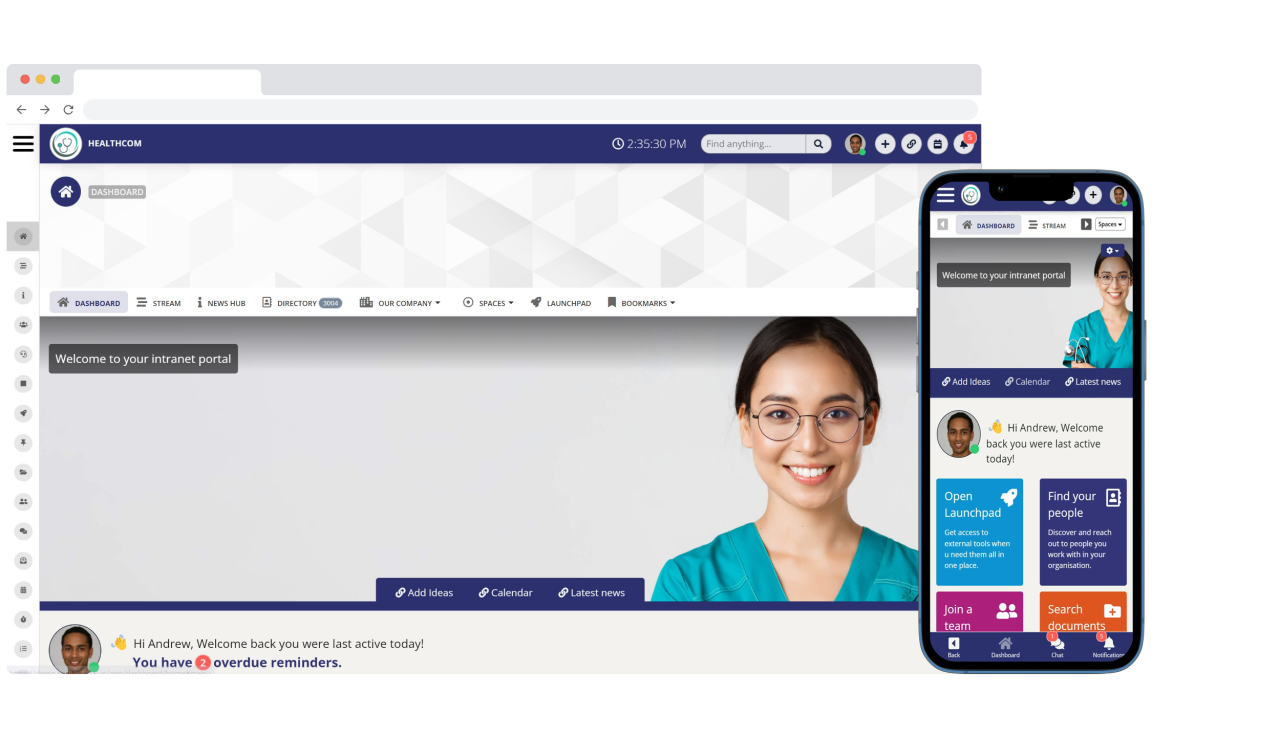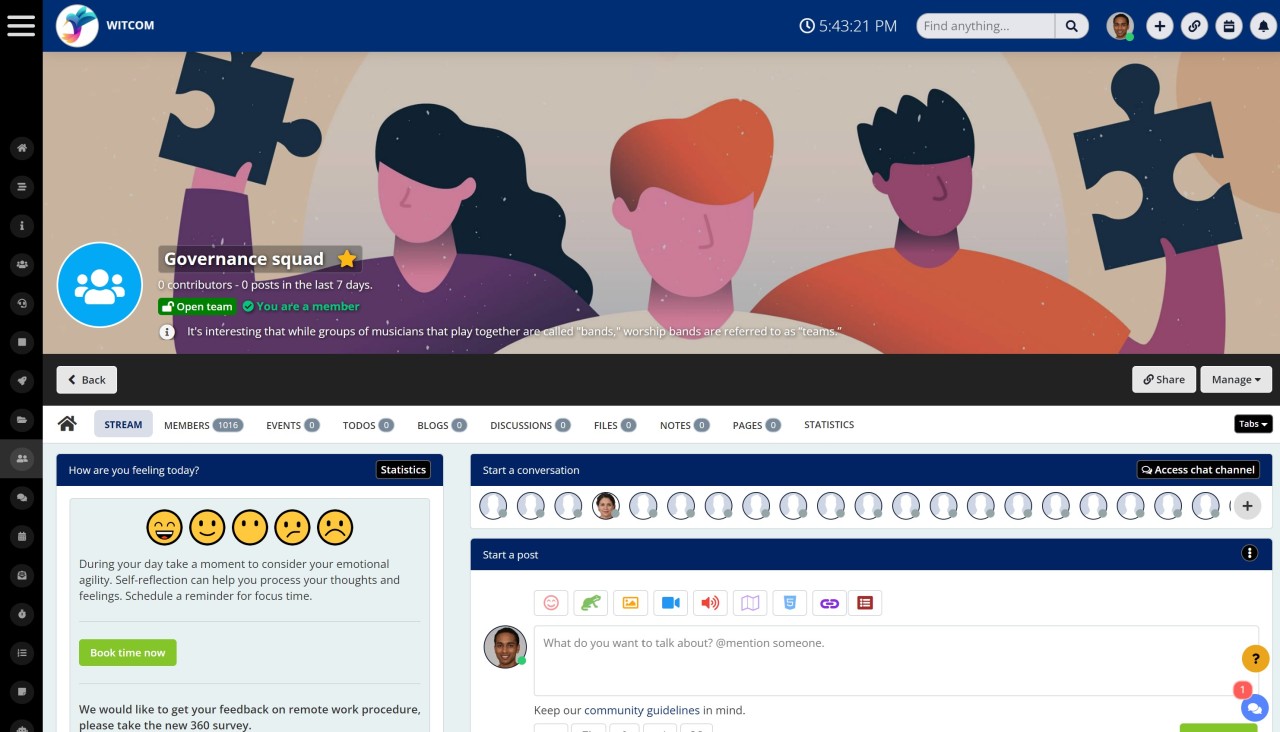Insight Blog
Agility’s perspectives on transforming the employee's experience throughout remote transformation using connected enterprise tools.
12 minutes reading time
(2439 words)
5 Reasons a Web Portal Is Key and Important Today for Businesses
In this article, we'll explore some of the key reasons why web portals are becoming more popular during the pandemic, first you may ask what is a web portal.
The COVID-19 pandemic has caused a significant shift in the way businesses operate, and many have had to adjust quickly to stay relevant.
One of the key changes is the increased popularity of web portals, which have become an essential tool for organizations looking to stay connected with their customers and employees.
The pandemic has brought about a lot of changes to the way we live and work, and one of the most significant shifts has been the move towards digital solutions.
With many people forced to work from home, and social distancing measures limiting physical interactions, businesses have had to find new ways to communicate and collaborate with their customers and employees. This is where web design services agency have played a crucial role.
Web portals also known as intranet portal have become an increasingly popular solution for this, offering a range of benefits such as secure access to information, streamlined communication, and improved efficiency.
In this article, we'll explore some of the key reasons why web portals are becoming more popular during the pandemic, first you may ask what is a web portal.
What is a web portal?
A web portal is an internet-based platform that serves as a singular point of access to information for employees, customers, and suppliers. Its main purpose is to offer personalized content, such as employee training manuals or customer profiles.
A web portal is used to facilitate information sharing and enhance communication among all parties involved in a business transaction.
By adopting an online business portal, you can replicate the ambiance and ambiance of your organization, and have more significant authority over the everyday business operations.
Regardless of the location and time, a web portal can be accessed through any device, whether it's a desktop or mobile device like a smartphone or tablet.
Social intranet software businesses use to boost overall employee experience: 14 Days Free Trial of AgilityPortal's
When to Use a Portal Platform
Small and medium-sized enterprises (SMEs) may seek to create or implement a web portal for a variety of reasons.
Such reasons may arise from a particular "pain" or "flash point" that a business experiences.
Common factors that typically drive the development of an online business portal include the need to improve communication and information sharing between the business and suppliers, as well as the presence of multi-location-based teams and offices. To address these needs, hiring dedicated developers can be invaluable, as they bring focused expertise to build scalable, customized portals that facilitate better connectivity and seamless collaboration across all locations.
It's worth noting that these drivers may vary, depending on the organization's unique characteristics and operations.
Some key indicators that a web portal may be necessary include:
- National or international offices across multiple locations
- Home-based or field-based employees
- The need for external contribution to data and processes to manage suppliers or channel retailers
- A demand for a scalable IT licensing option
- The need for increased visibility of information, by department, manager, or tailored to a specific individual
- The absence of a critical module in existing business systems that is essential for daily operations.
Get an Employee Intranet setup in less then 1 day: AgilityPortal is the best intranet software for all your communication and collaboration needs.
The workplace is changing.
Try a 14 days free trial now or Try our intranet calculator to calculator ROI of a Modern Intranet.
The workplace is changing.
Try a 14 days free trial now or Try our intranet calculator to calculator ROI of a Modern Intranet.
Web Portal Examples
There are multiple web portal formats, suitable for different types of businesses, industries, and the goals companies want to achieve with web portal implementation.
Some of the most popular examples are B2B portals, customer and employee portals, patient portals, community portals, financial, and eLearning and ecommerce portals, each with their unique purpose and functionality.
For instance, customer portals provide users with personalized recommendations and allow them to place and track orders or access their purchase history.
On patient portals, users can book doctor appointments and check their test results, whereas doctors can manage their appointments and communicate with patients.
Vendor portals, in their turn, provide information on procurement statistics, delivery dates, claim settlements, invoice payments, and more.
Today, the demand for professional web portal development continues to grow.
The client portal market is expected to reach $3.34bn by 2030, whereas the global patient portal market was valued at $2.9bn in 2022 and is expected to expand at a CAGR of 19.44% from 2023 to 2030.
Web portal software is designed to bring information from multiple sources together, enabling the sharing of content among various departments, customers, and suppliers.
SMEs often deploy a variety of web portals, including:
- Sales portal
- Project management portal
- Customer portal solution
- Membership portal
- CRM portal
- HR portal
- Intranet portal
- Corporate portal
For example, a sales portal can provide a centralized location for sales information, while a project management portal can help teams track progress on projects and tasks.
Similarly, a customer portal can allow customers to access relevant information and support services, and an HR portal can facilitate human resources tasks and activities.
An intranet portal can include features such as a company directory, a news and events section, an employee handbook, a document management system, a discussion forum, and a messaging platform.
Employee intranet portal It can also provide access to company-specific tools and applications, such as HR systems, project management software, and customer relationship management (CRM) software.
These types of portals can help businesses streamline their operations and enhance communication and collaboration with key stakeholders.
Overall, web portals can be valuable tools for businesses looking to improve their efficiency and productivity. To build a reliable and user-friendly portal, it's worth partnering with experienced web portal development companies that can deliver secure, scalable solutions tailored to your specific needs.
Here are a few other types of web portals:
| Type of portal | What Does it Do? |
| Customer portal | A customer portal is an autonomous online platform that provides clients with an individualized point of entry to pertinent information, like invoices, policies, orders, deliveries, and digital payments. The development of such a portal affords users constant availability, all day, every day, on both desktop and mobile devices. |
| eLearning Portal | An electronic learning portal is utilized to gain entry to courses, tools, and resources that facilitate the educational process. It functions as a depository for learning and teaching materials. |
| Partner or Supplier Portal | A partner portal allows a vendor to log in and access pricing information for a company's products to craft their marketing, distribution, or logistics strategies. The partner portal facilitates this brainstorming process by making internal information visible to partners. Specific security protocols frequently accompany it to prevent unauthorized use. |
| Community Portal | A communal portal presents data, scholarly articles, self-help modules, and a platform for discussion. It instructs, enthralls, and informs members of its audience. When constructing a communal portal for your brand or corporation, it must offer beneficial content to your intended audience or community. |
| Employee Portal | Worker portals are employed within a company where each employee has entry to work-related facts, such as training, due dates for projects, data on the progress of work, and other similar data, as well as tools for collaboration. These collaborative tools allow workers to manage the projects they are working on. |
| Student Portal | These portals are primarily utilized by universities and colleges, where students have the option to review their course syllabus, assignments, unpaid dues, and other general features through a customized entry point. |
| Banking Portal | Banking portals enable authorized customers to access their banking services via the internet. Clients can carry out digital transactions and regulate their accounts by means of these portals. |
Key differences between Web Portal and Website
When it concerns the development of web solutions tailored to specific needs, some individuals may find it challenging to differentiate between a web portal and website due to their shared characteristics.
While both are internet solutions that can be accessed using a unique web address, they serve distinct purposes and are not interchangeable. To elucidate these differences, we have prepared a comprehensive comparison table.
Firstly, a website is a digital platform that businesses employ to showcase their brand and transmit messages to interested parties.
It does not involve active participation from users, but rather aims to underscore brand distinctiveness and heighten brand recognition.
On the other hand, web portals have a more focused approach as they aim to provide particular individuals with specialized information. The content on web portals changes based on users' inputs.
While websites can provide static and dynamic content, web portals solely function with dynamic content and necessitate authorization from users.
Having comprehended the essential differences between web portals and websites, let us examine the former in more detail.
5 Commercial benefits of a business intranet portal
Let's explore what are the benefits of implementing a web portal with our top 5 reasons why companies should get a business intranet portal:
#1.Centralized access and sharing information priviately
A web portal can serve as a central hub for all the important information about products or services, customers or vendors, employees or patients.
For data security's sake, most portals also employ role-based access controls so that users could only access the information they need and have the right to. SSL certificate here is also a good option that enables a secured channel for data transition.
Moreover, a web portal can be integrated with business-critical applications like CRM, ERP, inventory management and payment systems and become a single point of access to all the relevant data.
For example, a patient portal can be integrated with billing and insurance management tools to help patients manage their medical expenses.
Similarly, companies can integrate their B2B customer portal with CRM and ERP systems to provide accurate information about prices and real-time inventory levels and optimize the ordering process
#2.Overall improved communication
A web portal is not only a single point of access to important data, but also a hub for communication between the company and its customers, employees, partners, or vendors.
Web portals also facilitate the exchange of information and ideas and streamline various types of interactions. Customers can get almost immediate answers to their questions directly from the service or product providers, and business partners can exchange important documents.
Patients can benefit from more frequent communication with physicians, and eLearning portal users can get immediate feedback from teachers and students. In some cases, a web portal can even send appointment reminders through SMS. This doctor appointment text message sample can show you how important this service can be for patients.
Overall, web portals help users to always stay up to date and interact with each other more efficiently.
#3.Improved user experience and engagement
According to the State of the Connected Customer research by Salesforce, 73% of customers expect companies to understand their unique needs and expectations and 94% of customers think they are more likely to make another purchase after a positive customer experience.
Using web portals, companies can provide their customers or partners with personalized and interactive experiences that have become a customer relationship staple.
Portal users can easily access information and services, receive training on product or service usage, place and track their orders, and interact with the business itself in B2B scenarios.
What is more, community portals provide users access to forums, blogs, and discussions tailored to their interests.
In addition to this, by equipping their web portals with self-service options, forums, feedback forms, and online chats, businesses can better engage with customers, gain valuable feedback, and build stronger relationships with both existing customers and target audiences.
Web portals can also keep their users informed about recent changes in business hours or service updates, which adds to the overall user experience.
Furthermore, web portals provide their users with 24/7 access to information and services from anywhere.
This means that customers can learn how to use the product, patients can book appointments, and a vendor can check the status of their payment whenever they want, regardless of the company's working hours. All this helps increase customers' satisfaction and loyalty.
#4.Data-driven insights
Serving as a hub for multiple users, web portals can collect various data about them.
Depending on the web portal's type, the data can include customers' purchases or vendors' supply history, employees' work logs, patients' personal info and test results, students' learning progress, and more.
With a web portals, companies can collect and analyze user data using different types of charts and graphs, infographics thus getting valuable insights into their behavior and preferences.
This way, using the gathered information, product or service companies can get valuable insights about customer behavior, preferences, and habits and improve products and services or create targeted marketing campaigns.
Similarly, healthcare organizations can utilize the data (of course, in compliance with HIPAA regulations) to streamline scheduling appointments, payment processing, and patient records management, improve and personalize patient care, and even conduct healthcare research.
This data can later be used for an ML model's supervised learning.
#5.Increased revenue
Finally, web portals can help businesses improve their bottom lines.
By analyzing customer behavior and preferences data, businesses can further optimize their product or service offer, gaining a competitive advantage.
Also, due to their convenience and exceptional user experience, web portals can help increase customer or vendor retention rates and increase sales.
Here ar ethe 6 most important area that can benefit your business:
- Decrease the cost of customer service.
- Simplify the process of ordering and re-ordering.
- Boost the amount of money spent per purchase.
- Improve marketing return on investment (ROI) through analytics.
- Expand the customer base and increase sales through greater exposure.
- Develop an interactive experience to drive sales.
Apart from that, companies can earn money through portal monetization methods such as advertising, affiliate marketing, sponsorships, and partnerships. Some community portals, for example, offer subscription-based models to grant access to exclusive or premium content.
Wrapping up
A well-designed and functional web portal with a seamless user experience can become your business's competitive advantage.
Web portals provide a single platform for centralized access to important information, help use data efficiently and draw maximum value from it, and improve collaboration and communication with your employees, customers, partners, or vendors.
So regardless of your business specifics, a properly developed and implemented web portal is sure to make a difference to your company.
Categories
Blog
(2726)
Business Management
(333)
Employee Engagement
(213)
Digital Transformation
(185)
Growth
(124)
Intranets
(121)
Remote Work
(61)
Sales
(48)
Collaboration
(43)
Culture
(29)
Project management
(29)
Customer Experience
(26)
Knowledge Management
(21)
Leadership
(20)
Comparisons
(8)
News
(1)
Ready to learn more? 👍
One platform to optimize, manage and track all of your teams. Your new digital workplace is a click away. 🚀
Free for 14 days, no credit card required.
















